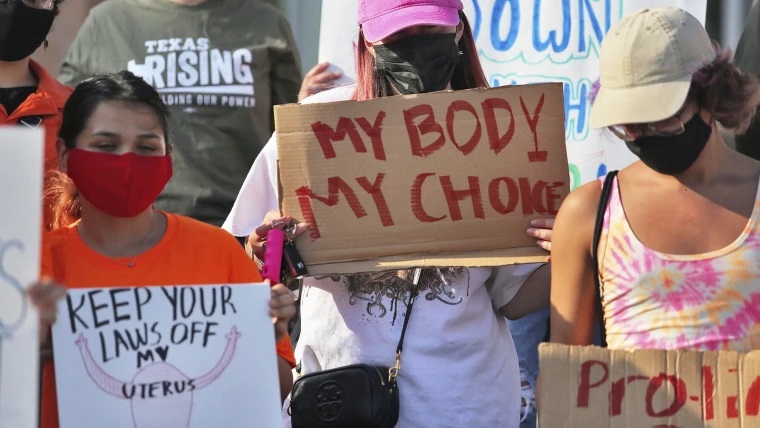
The most restrictive and radical abortion legislation seen in half a century in the US came into effect last week (1Sept.) in Texas after the US Supreme Court declined to intervene. The law, introduced as Senate Bill 8 or SB8, prohibits abortions when embryonic cardiac activity is detected which can occur at six weeks, before many know they have become pregnant. This holds even in cases of rape or incest. Moreover, the law provides private citizens with the right to sue those who provide or facilitate these abortions, including, amongst others, cab drivers. If the suit is successful, citizens may receive the monetary sum of $10,000.
The Supreme Court’s Ruling on Abortion Rights: Roe v Wade
Roe v. Wade was a landmark 7-2 decision made by the US Supreme Court (SC) in 1973. It’s ruling legalised abortion across the US under the constitutional “right to privacy” under the Due Process Clause of the Fourteenth Amendment. The case affirmed the constitutional right to abortion up until foetal viability, when a foetus can sustain life outside the uterus, which is usually at around 24 to 28 weeks. At this point, a state could legally prohibit an abortion unless it was deemed necessary in order to protect the mother’s life or health.
Yet, radical Bills which restrict access to abortions are not unique in the United States. Recently, many state policymakers have attempted to ban abortion before foetal viability. Over a third of US states have successfully implemented 20-week abortion bans (Guttmacher Institute, 2021).
However, until now, laws that ban abortion before 13 weeks have been consistently blocked by federal and state courts and Texas represents the first state to successfully ban abortion this early in pregnancy (Ibid, 2021). As highlighted by Supreme Court reporter, Lawrence Hurley, this appears to be due to the unique enforcement mechanism of the legislation: only private citizens can enforce the ban through private lawsuits and are incentivised to do so as they can receive at least $10,000 in damages (Durkee, 2021). Other states’ attempts to pass similarly restrictive abortion legislation had previously been deemed unconstitutional, as they directly violate the 1973 Roe v Wade decision.
Trump’s Legacy & The Supreme Court’s Failure to Block the Legislation.
The Trump administration’s role in the passing of this legislation must not be overlooked. During his presidency, Trump appointed the newest three justices Gorusch, Kavanaugh and Barret. This led to a Conservative 6-3 majority in the US Supreme Court, indeed, the most conservative the court has been since 1950 (Bailey, 2020). Late on Wednesday evening, the Supreme Court refused to block the law amid the requests by Texas abortion providers to do so. The decision was 5-4, with Trump’s SC appointees and two other conservatives voting to let the law stand.
In an unsigned order, the majority contended that the law “presents complex and novel antecedent procedural questions” which ultimately undermined the argument for blocking the statute at this initial stage (US Supreme Court, 2021; 1; Gerstein 2021).
This was criticised by the dissenting justices. Justice Sotomayor declared these procedural complexities were of the “State’s own creation” stressing “It cannot be the case that a State can evade federal judicial scrutiny by outsourcing the enforcement of unconstitutional laws to its citizenry” (US Supreme Court 2021; 1; 4).
Key Concerns
As the state of Texas has no role in enforcing the ban, they have ultimately outsourced the enforcement to private citizens leading to a vigilante justice system (Hurley, 2021). In doing so, it “deputises citizens to police other people’s bodies and blocks them from getting healthcare”, Amanda Klasing of Human Rights Watch wrote on Twitter (Klasing, 2021). Critics have also stressed that this ban will also disproportionately impact poorer and marginalised communities (Durkin, 2019).
What’s more, it is widely acknowledged that criminalising abortion does not stop abortions taking place. Instead, it merely makes them less safe, with many leading to fatality (Amnesty n.d.). Indeed, after the legalisation of abortion following Roe v. Wade, the number of abortions in the US remained the same at roughly a million. The key effect of the 1973 ruling was the substantial decrease in the rate of deaths as a result of unsafe illegal abortions (Gold, 2003). According to the World Health Organisation, unsafe abortions are one of the top causes of maternal death globally, and lead to roughly 5 million preventable disabilities (Ibid). Additionally, the US already has the highest maternal mortality rate among developed countries (Melillo 2020; Amnesty 2011) and US States with the worst anti-abortion laws already have the worst infant and maternal mortality rates (Hiltzik, 2019).
It is likely that this law will also embolden other states to pass similar laws designed to skirt judicial scrutiny (Aratani, 2021). Florida lawmakers have already signalled they intend to copy the blueprint of Texas’s abortion legislation (Durkee, 2021).
Condemnation of the Ban
Human rights organisations have fiercely attacked the legislation, highlighting the severe consequences the ban will have on pregnant people. Amnesty International argue the ban “must be condemned unequivocally for undoing decades of safeguards for the well-being of pregnant people” (Amnesty, 2021; para 4). Moreover, on Wednesday, the UN human rights office, noted its “serious concern” over the law via Twitter, stating it “endangers women with unprecedented obstacles to safe abortion” (OHCHR, 2021b).
Subsequently, Biden declared the Supreme Court’s ruling represented “an unprecedented assault on a woman’s constitutional rights”, directing the Gender Policy Council and the Office of the White House more broadly to launch a “whole-of-government effort to respond to this decision” (Biden, 2021). House Speaker, Nancy Pelosi has also announced that the House of Representatives will vote on the Women’s Health Reproductive Act when it returns from its recess, which would enshrine the right to an abortion into federal law (Durkee, 2021; Lowell 2021)
Conclusion
Ultimately, access to a safe abortion is a human right. Under international human rights law (IHRL), ensuring access to safe abortion is part of the State obligation to eliminate discrimination against women and to ensure, inter alia, their right to health (OHCHR, 2020). The US government must therefore protect the rights of pregnant people, including their right to abortion and continue to fight this decision. The proposed Women’s Health Reproductive Act may prove integral in this.
References
Amnesty., (2011), DEADLY DELIVERY: THE MATERNAL HEALTH CARE CRISIS IN THE USA, [online], Available at: https://www.amnestyusa.org/reports/deadly-delivery-the-maternal-health-care-crisis-in-the-usa/, Accessed: 05/09/21
Amnesty., (2021), USA: new law banning abortions in Texas after six weeks condemned, [online], Available at: https://www.amnesty.org.uk/press-releases/usa-new-law-banning-abortions-texas-after-six-weeks-condemned, Accessed: 05/09/21
Amnesty., (n.d.), KEY FACTS ON ABORTION, Amnesty International, [online], Available at: https://www.amnesty.org/en/what-we-do/sexual-and-reproductive-rights/abortion-facts/, Accessed: 02/09/21
Aratani., (2021), Biden condemns US supreme court’s ‘unprecedented assault’ on abortion rights, The Guardian, [online], Available at: https://www.theguardian.com/us-news/2021/sep/02/biden-supreme-court-texas-abortion-ban, Accessed: 05/09/21
Bailey. M., (2020), If Trump appoints a third justice, the Supreme Court would be the most conservative it’s been since 1950, The Washington Post, [online], Available at: https://www.washingtonpost.com/politics/2020/09/22/if-trump-appoints-third-justice-supreme-court-would-be-most-conservative-its-been-since-1950/, Accessed: 02/09/21
Biden J., (2021), Statement by President Joe Biden on Supreme Court Ruling on Texas Law SB8, The White House, [online], Available at: https://www.whitehouse.gov/briefing-room/statements-releases/2021/09/02/statement-by-president-joe-biden-on-supreme-court-ruling-on-texas-law-sb8/, Accessed: 05/09/21
Durkee. A., (2021), Florida Lawmakers Suggest They’ll Copy Texas’ Abortion Ban—And Other GOP States Will Likely Follow, [online], Available at: https://www.forbes.com/sites/alisondurkee/2021/09/02/florida-lawmakers-suggest-theyll-copy-texas-abortion-ban-and-other-gop-states-will-likely-follow/?sh=2962754b1bdf, Accessed: 03/09/21
Durkin. E., (2019), ‘Women will die’: how new abortion bans will harm the most vulnerable, The Guardian, [online], Available at: https://www.theguardian.com/us-news/2019/may/19/abortion-ban-alabama-women-of-color-poor, Accessed: 05/09/21
Gerstein. J., (2021), Supreme Court declines to block Texas abortion law, Politico, [online], Available at: https://www.politico.com/news/2021/09/02/texas-abortion-supreme-court-declines-block-508857, Accessed: 03/09/21
Gold. R. B., (2003), Lessons from Before Roe: Will Past be Prologue?, Guttmacher Institute, Volume 6, Issue 1, [online], Available at: https://www.guttmacher.org/gpr/2003/03/lessons-roe-will-past-be-prologue#, Accessed: 05/09/21
Guttmacher Institute., State Bans on Abortion Throughout Pregnancy, [online], Available at: https://www.guttmacher.org/state-policy/explore/state-policies-later-abortions, Accessed: 05/09/21
Hiltzik. M., (2019), Column: States with the worst anti-abortion laws also have the worst infant mortality rates, Los Angeles Times, [online], Available at: https://www.latimes.com/business/hiltzik/la-fi-hiltzik-anti-abortion-infant-mortality-20190515-story.html, Accessed: 05/09/21
Hurley. L., (2021), Biden warns of ‘unconstitutional chaos’ due to Texas abortion ban, Reuters, [online], Available at: https://www.reuters.com/world/us/us-supreme-court-declines-block-texas-abortion-ban-2021-09-02/, Accessed: 03/09/21
Klasing. A., (2021), Twitter, [online], Available at: https://twitter.com/AMKlasing/status/1433109785516314629?ref_src=twsrc%5Etfw%7Ctwcamp%5Etweetembed%7Ctwterm%5E1433109785516314629%7Ctwgr%5E%7Ctwcon%5Es1_&ref_url=https%3A%2F%2Fwww.hrw.org%2Fnews%2F2021%2F09%2F04%2Ftop-human-rights-tweets-week, Accessed: 05/09/21
Lowell. H., (2021), Democrats rush to find strategy to counter Texas abortion law, The Guardian, [online], Available at: https://www.theguardian.com/us-news/2021/sep/02/texas-abortion-law-biden-democrats-congress, Accessed: 05/09/21
Melillo. G., (2020), AJMC, [online], Available at: https://www.ajmc.com/view/dr-william-andy-nish-on-increasing-medication-adherence-for-asthma-therapies, Accessed: 05/09/21
OHCHR., (2020), ABORTION, INFORMATION SERIES ON SEXUAL AND REPRODUCTIVE HEALTH AND RIGHTS, [online], Available at: https://www.ohchr.org/Documents/Issues/Women/WRGS/SexualHealth/INFO_Abortion_WEB.pdf, Accessed: 05/09/21
OHCHR., (2021), Twitter, [online], Available at: https://twitter.com/UNHumanRights/status/1433159160473002000, Accessed: 05/09/21
US Supreme Court., (2021), WHOLE WOMAN’S HEALTH ET AL. v. AUSTIN REEVE JACKSON, JUDGE, ET AL. ON APPLICATION FOR INJUNCTIVE RELIEF, SUPREME COURT OF THE UNITED STATES, 594 U. S. (2021), [online], Available at: https://www.supremecourt.gov/opinions/20pdf/21a24_8759.pdf, Accessed: 03/09/21
By Catherine Greenacre,The European Institute for International Law and International Relations.














